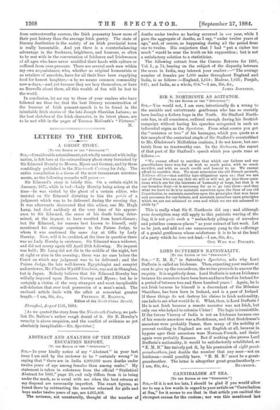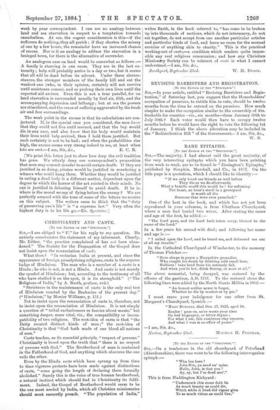CANNIBALISM AT SEA.
[To THE EDITOR OF THE "SPECTATOR."] SIR,—If it is not too late, I should be glad if you worth! allow- me to say a few words in regard to your article on "Cannibalism at Sea," for it seems to me that in that article you omitted the strongest excuse for the custom; nor was this mentioned last week by your correspondent. I can see no analogy between land and sea starvation in respect to a temptation towards cannibalism. At sea, the cogent consideration is this—if the sufferers do nothing, they all perish ; if they shorten the misery of one by a few hours, the remainder have an increased chance of rescue. Nor is it an analogy to adduce the starvation in a besieged town, for there is the alternative of surrender.
An analogous case on land would be somewhat as follows :— A family is starving in one room. They are in the last ex- tremity; help will probably arrive in a day or two, but it seems that all will be dead before its advent. Under these circum- stances, the stronger members of the family kill and eat the weakest one (who, in their opinion, certainly will not survive until assistance comes), and so prolong their own lives until the expected aid arrives. Even this is not a true parallel, for on land starvation is surrounded usually by foul air, filth, and the accompanying depression and lethargy ; but at sea the powers are stimulated, and the sense of suffering aggravated by the fresh air and free surroundings.
The weak point in the excuse is that its calculations are con- jectural. If, in the special case you considered, the men knew that they could not live until rescued, and that the boy would die in any case, and also knew that his body would maintain their lives until help arrived, then I hold them justified. But such certainty is not to be had ; and when the probabilities rise high, the excuse seems very strong indeed to me, at least when [We print this letter just to show how deep the evil tradition has gone. We utterly deny our correspondent's proposition that men may commit murder to avoid certain death. If they are justified in so doing, pirates would be justified in murdering a witness who could hang them. Whether they would be justified in eating a dead body is a different matter, dependent upon the degree to which the horror of the act existed in their minds. No one is justified in debasing himself to avoid death. If he is, where is the moral wrong of flying before the enemy ? We are perfectly amazed with the tone of some of the letters we receive on this subject. The writers seem to think that the "duty of preserving one's life" is "a supreme law." Very often the highest duty is to let life go.—En. Spectator.]

































 Previous page
Previous page